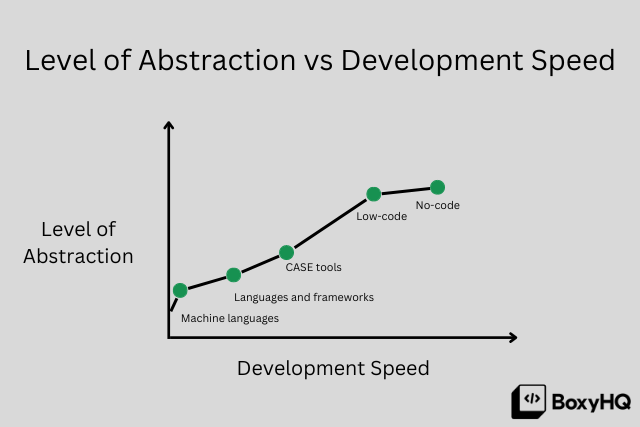How low-code solutions are changing how we build products and workflows
We have all heard the terms low-code or no-code being thrown around as buzzwords over the last few years but what does this mean and how is it changing the way businesses and individuals solve problems? I am going to use our product SAML Jackson to explain how low-code solutions are changing the way we build products.
Low-code solutions are essentially products that provide you with building blocks so instead of building a solution from scratch you can simply combine the relevant building blocks to make a relevant solution for your business. Let’s take BoxyHQ and our SAML Jackson product as an example. Without the low-code product (SAML Jackson) the alternative for businesses would be to build a custom SAML integration which takes months and a ton of resources. This sounds ridiculous tho right? With the number of businesses who are deploying SAML for their customer, there must be some reusable parts that can be shared to reduce the time it takes each business. This is where low-code products like SAML Jackson come in. By building the SAML integrations as a reusable component, businesses only need to create one simple connection to the SAML Jackson to deploy SAML.
Still with me? If not, don't worry. Essentially what low-code is taking advantage of is building in a way that can be shared so the amount of custom building is limited (or low) for common use cases.
So what is the difference between low-code and no-code?
Well while a lot of people would still group them together, the obvious difference is that low-code still needs some code to integrate the building blocks, whereas no-code doesn't. If we look at a product like Zapier for example, that requires no code at all and a non-technical person can use visual blocks to connect different data sources and outputs to build workflows. An example of this is as a non-technical person I can take data from forms such as Hubspot forms that are submitted on our website and create notifications for the team on Slack. Doing all of this without code and just using Zapier is what makes this a no-code solution.
Why is low-code so important?
Lastly, let's take a quick look at the main benefits of having solid DevSecOps in place
-
Speed speed speed
In today's world businesses need to be agile and fast. With competitors springing up every day and customer expectations high the last thing a business wants to do is to have to make specialist hires for each element of their build or spend precious time on auxiliary features that also have their learning curve. The birth of plug-and-play has meant that businesses can operate faster and more efficiently than ever before. Can you imagine if a business had to build all its tools from scratch? No neither can I.
-
Cost
Cost is always a major element that businesses and individuals look at when finding a solution and in the case of low-code it comes down to the question of build V buy. For larger enterprises who have not fully adopted the trust and efficiency of low-code they might still choose to build their own solution which will cost them a lot more in resources and time but that might be something, they have spare. Smaller businesses who want to focus on their core offerings will always look for reliable plug-and-play solutions such as low-code which allow them to quickly deploy solutions and stay competitive while saving on the large number of resources needed to build from scratch.

Are there any negatives to using low-code and no-code platforms?
The only main negative of these solutions I have identified is that because of the ease and speed of the platforms it can create a lack of transparency and some shadow IT as lots of people in the organization can be building solutions and data can be moving around without accountability. However, with the right IT processes and policies in place, this can be easily fixed.
Why are we so excited about low-code and no-code?
We are very excited about low-code solutions because it drives innovation! We at BoxyHQ are building low-code solutions for enterprises to implement the important but standard features they need to be competitive and compliant with ease so they can focus on what they do best which is innovate. We have some great clients already and can’t wait to see what they do next without the hassle of building standard features such as SSO and Directory Sync.
